#story of your life
Explore tagged Tumblr posts
Text

#arrival#denis villeneuve#amy adams#story of your life#films#movies#movie#filmedit#cinematography#cinemapix
44 notes
·
View notes
Text

For our next twitter party, we want to talk all about the strong bonds between the siblings of the Grishaverse using the tag #StoryOfYourLife! Come prepared with your best tweets, questions, comments, gifs, memes, and more. Let's make some noise! 🗣️
#SaveShadowAndBone and #SixOfCrowsSpinoff TWEETING PARTY 9/5 at 12PM! Come check it out here!
Remember to:
Only use three hashtags.
Enjoy and be engaging with your tweets! Keep sharing! Timezones under read more.
If you cannot attend, you can always schedule tweets ahead of time on desktop in order to help out still!
ALL TIMEZONES: Thursday, Sep 5: 9am PST 10am MST 11am CST 12pm EST 2pm -03 5pm GMT 6pm CET 8pm MSK 9pm +04 10:30pm IST
Friday, Sep 6: 1am CST 2am JST 4am AEST 6am NZST
#saveshadowandbone#six of crows#grishaverse#shadow and bone#netflix shadow and bone#netflix#sab#soc#six of crows fandom#soc and ck#six of crows spin off#six of crows spinoff#sixofcrowsspinoff#no mourners no funerals#emmy nominated#save the grishaverse#third army#story of your life
13 notes
·
View notes
Text
Our biggest source of confusion was the heptapods' "writing.” It didn't appear to be writing at all; it looked more like a bunch of intricate graphic designs. The logograms weren't arranged in rows, or a spiral, or any linear fashion. Instead, Flapper or Raspberry would write a sentence by sticking together as many logograms as needed into a giant conglomeration. This form of writing was reminiscent of primitive sign systems, which required a reader to know a message's context in order to understand it. Such systems were considered too limited for systematic recording of information. Yet it was unlikely that the heptapods developed their level of technology with only an oral tradition. That implied one of three possibilities: the first was that the heptapods had a true writing system, but they didn't want to use it in front of us; Colonel Weber would identify with that one. The second was that the heptapods hadn't originated the technology they were using; they were illiterates using someone else's technology. The third, and most interesting to me, was that the heptapods were using a nonlinear system of orthography that qualified as true writing.
Ted Chiang, Story of Your Life
#quote#Ted Chiang#Chiang#scifi#science fiction#language#heptapods#heptapod#linguistics#communication#technology#orthography#Story of Your Life
54 notes
·
View notes
Text

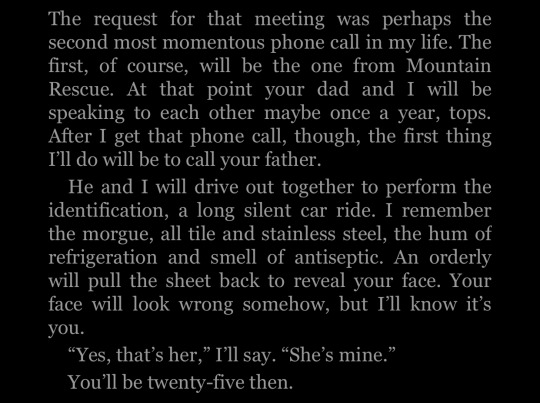

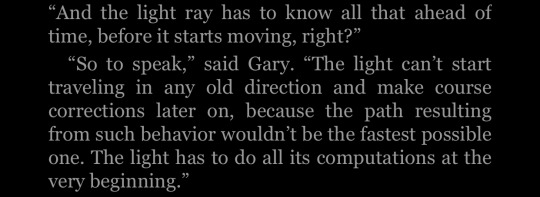



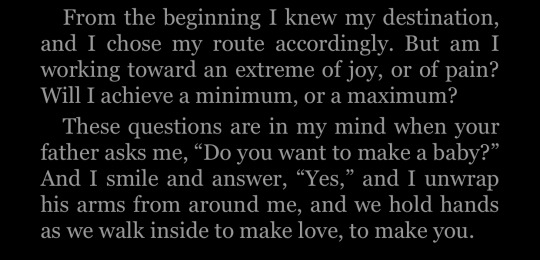
“Story of Your Life,” by Ted Chiang
#story of your life#ted chiang#arrival#had to make my own quotes post w my favs for maximum damage#amaryllis
47 notes
·
View notes
Text
In war there are no winners, only widows.
— Arrival (2016), directed by Denis Villeneuve and adapted by Eric Heisserer. This sentence is said in Mandarin, and no translation is provided on screen.
#arrival#ted chiang#story of your life#oppenheimer#nuclear war#world war 2#world war ii#center for nuclear disarmament#hiroshima and nagasaki
56 notes
·
View notes
Text
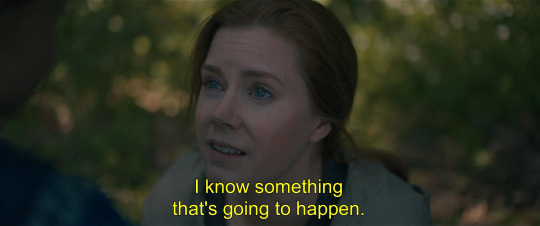
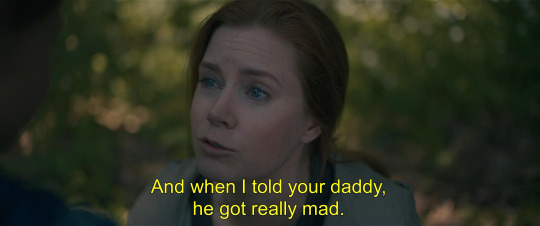
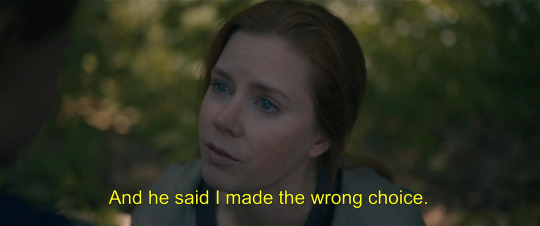


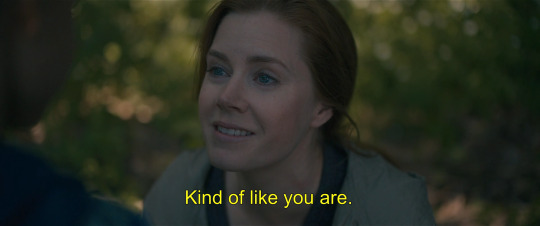

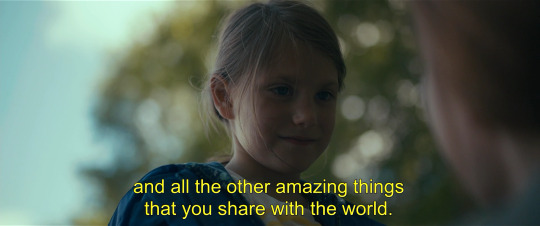


Arrival, 2016
#drama#mystery#sci-fi#arrival#denis villeneuve#eric heisserer#ted chiang#story of your life#amy adams#abigail pniowsky#strenght
35 notes
·
View notes
Text
Anyone got movie reccs like Arrival, The Martian or Interstellar? 😔😔 especially if the main character is a woman 🙏🏽🙏🏽🙏🏽🙏🏽🙏🏽 pleasepleasepleasepleasepleaseple
3 notes
·
View notes
Text
Short Story Tournament
THE CASK OF AMONTILLADO by Edgar Allen Poe (1846) (link) - tw: death
“I drink,” he said, “to the buried that repose around us.”
STORY OF YOUR LIFE by Ted Chiang (1998) (link) - tw: death
Freedom isn't an illusion; it's perfectly real in the context of sequential consciousness. Within the context of simultaneous consciousness, freedom is not meaningful, but neither is coercion; it's simply a different context, no more or less valid than the other.
#short story tournament#the cask of amontillado#story of your life#edgar allen poe#ted chiang#round 4#polls
22 notes
·
View notes
Text
“When writing the story of your life, don’t let anyone else hold the pen.”
- Jack Kerouac
4 notes
·
View notes
Text
Arrival (2016)

Watching Arrival a second time takes away its surprises but gives you a new appreciation for its storytelling. It’s a wholly different experience. You pick up on certain character beats and structural points that were impossible to spot the first time around. It’s a brainy sci-fi film so make sure you block off at least a half hour after it’s over to discuss it with your friends.
Twelve mysterious alien spacecraft have appeared across the globe. The U.S. government selects Linguist Louise Banks (Amy Adams) to help communicate with the extra-terrestrials. She begins deciphering the way these visitors communicate but progress is slow. While Louise and theoretical physicist Ian Donnelly (Jeremy Renner) desperately try to convey critical human ideas and concepts to the visitors, the rest of the world becomes increasingly wary.
Residing in the same neighbourhood as Close Encounters of the Third Kind and Interstellar, Arrival is about aliens but really, it’s about communication. Think about how many ways we communicate and how so many things are assumed when two people are face-to-face. You don’t have to speak the same language to know what barred teeth means. Smiles are universal. Even with all these things in common, we still misunderstand each other constantly. Now imagine communicating with a creature that (as far as we can tell) doesn’t even have a face. You wouldn’t know where to begin. At least you know they’re intelligent and willing to communicate. They haven’t blown us up yet. That’s promising.
Much of the joy of Arrival comes in the procedural bits. When Louise has an “aha!” Moment and makes a breakthrough, it’s the most exciting thing you’ve seen. The more her work comes together, the more eager you are for her and Donnelly to share what they’ve found with their superior (Forest Whitaker as Colonel G. T. Weber) and then get right back to teaching new words to the Heptapods.
The whole movie could’ve been just about learning to communicate with the visitors but unfortunately, mankind is never as open-minded as it should be. You can see the progress they're making but when Louise tries to explain it to others, they just don’t understand. Tiny, seemingly insignificant decisions snowball into avalanches which threaten not only this operation but the entire human-heptapod encounter and possibly, the world. There’s a sense of wonder and excitement blended with suspense and nerve-eroding fear that something will go horribly wrong any minute.

Now that we know the ending, aspects of the story change completely. Initially, you assume the images of Louise and her daughter Hannah are flashbacks. These "explain" why, she is now alone and isolated. Actually, those are not memories; they're glimpses of her future. Deciphering the alien language and immersing herself in it allows Louise to perceive time as they do: non-linearly. It’s an example of time travel done right. Louise can suddenly look into her future and find crucial information from conversations that haven’t happened yet, bring them “back” and make them happen. How did she know what words General Shang shared with his wife before she passed? In a way, she always knew. That’s how time loops work and if you don’t understand it, this is where that half hour you set aside will come in handy. The problem is that you’re still thinking of time as a line when it isn’t; not anymore.

Arrival has an airtight screenplay. Re-evaluating its story and themes further emphasizes how much time and effort was spent polishing it. It’s complex, which makes the moment where it finally clicks immensely satisfying. As a bonus, it’s wonderfully acted, extremely moody, gorgeous to watch and masterfully directed. This is the best sci-fi film we’ve seen in a long time. (On Blu-ray, March 15, 2019)
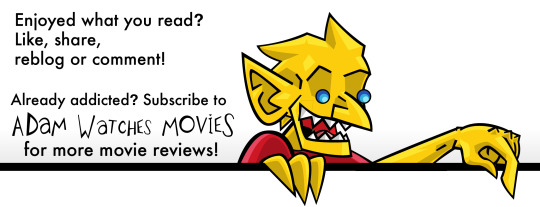
#Arrival#movies#films#movie reviews#film reviews#Denis Villeneuve#Story of Your Life#Ted Chiang#Eric Heisserer#Amy Adams#Jeremy Renner#Forest Whitaker#Michael Stuhlbarg#Tzi Ma#2019 movies#2019 films
13 notes
·
View notes
Text
i love you inevitably i love you determinism i love you no free will i love you “screw it, everybody dies” i love you “what if the experience of knowing the future changed a person? what if it evoked a sense of urgency, a sense of obligation to act precisely as she knew she would?” i love!!!
#things that give me that pleasurable chest rumble#or perhaps that’s just the johann johannsson score#arrival#story of your life
7 notes
·
View notes
Text
Division by zero
This story is about a woman (and her husband) who discovers a mathematical equation that disproves our entire mathematical system and gets depressed over it. It's told both from her and her husband's perspective with some added intermissions about general math history. Overall the story is fine but it feels a bit lackluster that the realisation that math is "fake" since I thought that was pretty common knowledge, we just assigned numbers to things and then made rules about it. This story just lacked the hook the previous two stories had.
Rating: B
#ted chiang#berättelser om ditt liv#story of your life#division by zero#book#reading#liveblog#text#not mine
5 notes
·
View notes
Text
A few years ago, when ships appeared in orbit and artifacts appeared in meadows. The government said next to nothing about them, while the tabloids said every possible thing.
Story of your life - Ted Chiang
6 notes
·
View notes
Text
story of your life is SO fucking good everyone needs to read it this is my truth
5 notes
·
View notes
Text
Spoilers and commentary from my latest rewatch below a cut.
I think this is my favorite Villeneuve movie of the ones I've seen (all his movies starting with Sicario).
There's a thing that I'm very sensitive to with sci-fi movies, dating to my childhood growing up reading hard sci-fi. I'm very unforgiving of stupid stuff that doesn't make sense. Noisy space, crowded orbits, gravity and inertia effects that don't remotely try to be believable... Certain kinds of space opera or whimsical fun I'm okay with; I love Buckaroo Banzai, Space Sweepers, and The Fifth Element (for example) even though they require me to turn off my believability sensors. But if a movie expects me to take it seriously as sci-fi it has to try not be stupid. And there are a lot of sci-fi movies that expect me to take them seriously that fail that test.
Which is fine; not every movie has to be for me.
Arrival is totally for me.
It does have some things that threaten to pull me out of the story. But I let those go because I'm emotionally invested. The big plot twist really works; Louise's depression at the beginning of the movie doesn't have to be a result of the sequence of events we've seen, but it makes sense that it would be. Rewatching the movie knowing what's really going on doesn't diminish the impact.
Villeneuve is so good at minimal storytelling. He does the "show me 2+2 but not 4" thing. He'll leave out the idiot lecture and trust me to understand, and he's so good at conveying mood that I know exactly what to feel even if all the pieces aren't laid out neatly in front of me.
There are some weaker parts of the movie. Ian's characterization suffers from a lack of detail, and the kooky-soldiers subplot is like stick figures. But I'm cool with saving that time for Louise's story, because Amy Adams' performance is so good. I'm still bummed she didn't get a Best Actress nomination.
One weird thing I noticed on my latest rewatch: When they have the montage narrated by Ian to cover the month or so when they're first making progress with heptapod language, I can see why it helps the pace of the movie, but I'm bothered that it doesn't really make sense. Where is that narration coming from? Ian delivers it in present tense, but who is he talking to? Why is this documentary being made? Who is it for? Some kind of government briefing? Some sort of personal log? Villeneuve expects the audience to recognize the format and not worry about it. Which is okay, I guess, though it bugs me that an explanation isn't even suggested.
I spent a lot of time on this rewatch thinking through the implications of the movie's big idea: how knowing heptapod language rewires Louise's brain to allow her to experience time the way they do. It seems especially significant given that the emotional climax of the movie is Louise's choice to have Hannah despite knowing the future.
Which is a) really cool in how it is depicted: not by showing us the events (like Louise and Ian's breakup) actually happening, but by seeing the effects. Louise realizes "why my husband left me" as she's talking to Ian after her last visit to the shell. Hannah has the conversation with Louise about why her father left, and how he doesn't look at her the same way any more. But also b) super interesting in terms of the implication of the heptapod concept of time on the narrative stakes of the story.
What I mean is: The climax of the story is Louise's choice to have Hannah despite knowing the future. The moment in which she makes that choice is literally the last shot of the film. Except that according to heptapod cosmology she doesn't make a choice at all.
In heptapod cosmology causality doesn't exist. There are no choices. There is just one timeline, one sequence of events, with past, present, and future all existing whole and complete. Louise gets Shang's private number and learns his wife's dying words from him so she can call him 18 months previously and convince him to stand down. The heptapods come back and deliver their language to humanity thousands of years in the past so humanity can help them in the future. Those events are immutable. They always happen, and always did happen.
That immediately raises the question of free will. If Louise, having seen the future, chooses to try to prevent that future from happening, what is the result? Does she follow a different branch in the multiverse to a different future? Or does it turn out that her action to prevent the future actually ends up creating the exact future she already saw? (There are other ways to try to resolve this issue, but those are the big ones.)
In the first of those scenarios free will is preserved, but at the cost of foreknowledge; Louise can't act on the basis of knowing future events without changing those events. In the second scenario foreknowledge is preserved, but at the cost of free will. Louise doesn't actually have a choice to make, because she's already made it as part of the playing out of the singular timeline. It might look and feel like a choice from a linear-time perspective, but only from that perspective.
On this rewatch I was thinking through the implications of this, and it struck me that Ian really is wrong to blame Louise. He thinks she made the wrong choice having Hannah. But from Louise's heptapod-language-informed perspective, there was no alternative. She chose life for Hannah, even a tragically short life, but only in the sense that she always had and always would make that choice in the singular timeline that heptapod language revealed to her.
In a sense Arrival is structured as a story about someone who learns to speak heptapod, but told by and for people who don't speak heptapod. The film's dramatic arc, leading up to the key moment when Louise chooses to have a child she knows to be doomed, is based on a lie, the lie that she actually makes a choice.
Except for this: I've watched this movie something like 5 or 6 times now. I'll probably watch it again. In choosing to rewatch it, and in finding it emotionally satisfying even though I know how it ends, I'm playing out a heptapod-cosmology scenario myself. If rewatching a beloved movie can be satisfying even though I know what will happen, then there can be emotional significance in Louise choosing life for Hannah, even if Louise always only ever made that choice the one way.
Side note: If Hannah dies in a preventable accident rather than from an incurable disease the issue gets more complicated. In "Story of Your Life" (the story Arrival was based on), Ted Chiang embraced that complexity; Louise's daughter dies at 25 in a rock-climbing accident, and Louise doesn't use her foreknowledge to try to prevent it. I respect that storytelling choice. But movies don't have the space that novellas do to explore complex ideas, so I guess I forgive the screenplay for changing that, even though it bugs me a little to see the puppet strings.
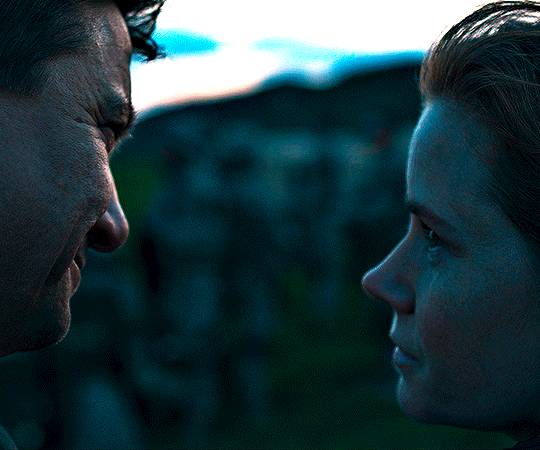
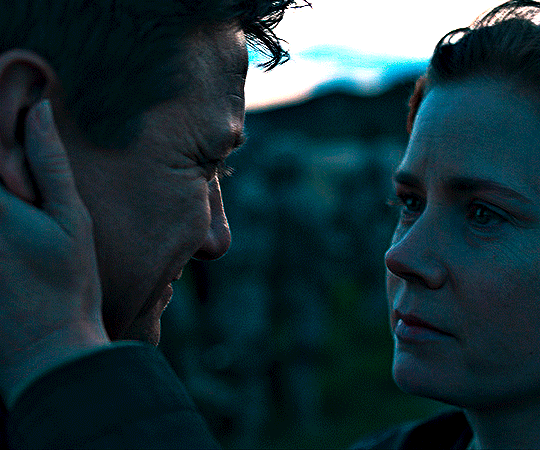
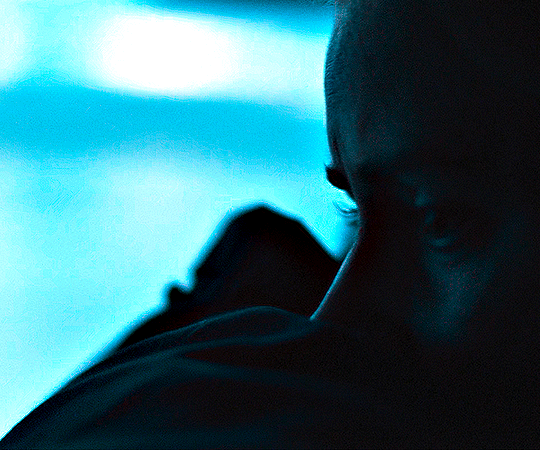

Despite knowing the journey and where it leads, I embrace it. And I welcome every moment of it.
Arrival (2016) dir. Denis Villeneuve
2K notes
·
View notes
Text

ETAT LIBRE D'ORANGE - STORY OF YOUR LIFE - Eau de Parfum - Novità 2024 -
The morning after. Love shades. Emotion. Devotion. Breakfast eyes into eyes. Wishful thinking. One voice. Complicity. Romantic Love. Yes. That’s the shape of my heart.
...
Stupore per questa nuova fragranza che accompagna il ricordo di un amore che è stato, che è, o che verrà. Un incontro di battiti sordi e sguardi sfuggenti, la gentilezza del cuore come primo sintomo, l’assillo dei pensieri, pathos perenne ancorato al più dolce degli attimi vissuti.
Story of Your Life, ultima creazione di Etat Libre d’Orange, svela un’inaspettata sensibilità romantica, una dolcezza abissale, un richiamo all’amore quale fulcro di ogni cosa, come nella poetica di Paul Éluard, la consonanza di due anime, l’intimo vincolo, delirio dei sensi ma sola risorsa utile a colmare il vuoto della solitudine e dare senso alla vita.
Questa narrazione d’amorosi palpiti è sviluppata nel tratteggio chiaroscuro della passione, uno slancio olfattivo gourmand floreale che simula lo scorrere del tempo, l’intimità della prima colazione insieme tra sentori di croissant e pane tostato, soffici di burro e marmellata d’arancia.
Poi le emozioni corrono sulle lancette, questa dolce estasi manifesta contorni più caldi e confortanti con davana, cisto e benzoino, spazia nella ricercatezza boozy di rum e cacao, infine attutisce l’impatto mielato nel contrasto aromatico con l’alloro, più fresco e pungente.
Il finale è un primo premio su pelle, vaporoso di patchouli, vaniglia e legni ambrati, riporta il desiderio all’origine, la dolcezza cede alla passionalità nel suo rifugio più recondito, la notte.
Creata da Jérôme di Marino.
Eau de Parfum 50 e 100 ml. In selezionati p.v.
©thebeautycove @igbeautycove


1 note
·
View note